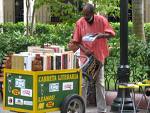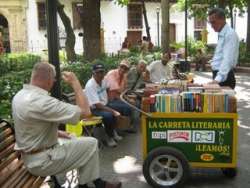 For many years Martin Murrillo earned a living selling water on the streets of Cartegena, a city on the northern coast of Colombia. Born into poverty, he started work very young and missed out on much of his schooling.
For many years Martin Murrillo earned a living selling water on the streets of Cartegena, a city on the northern coast of Colombia. Born into poverty, he started work very young and missed out on much of his schooling.
Gifted with a lively and curious mind, the young Martin began a process of self-education. This involved reading absolutely everything he could lay his hands on. Every moment he wasn't serving customers was a chance to bury his head in a book, writes Vida Adamoli
One day, intrigued by the sight of a street-vendor reading Gabriel García
Márquez, a passing journalist stopped for a chat. He was impressed by Martin's hunger for knowledge and offered to give him a pile of books gathering dust in his office. These books were to become the foundation of the Cart Library with its mission to bring literature to people who normally wouldn’t read. Especially street children raised in poverty like himself.

The green and yellow painted cart holds 160 books. Martin has another 1000 stacked floor
to ceiling in his rented bed-sit. There are even books under the bed. His sense of mission is stronger than ever. Once a week he trundles his cart to the women's prison whose library is always locked.
Martin believes that introducing people to the magic of reading is introducing them to the magic of life. It also means they are less easily manipulated by those in power. ‘When people don’t read, they believe anything anyone tells them,’ he says. ‘When you read, you learn.'
Neighbouring Venezuela has also come up with a novel method to take
books into remote communities and encourage people to read. They are
using bibliomulas (book mules) as mobile libraries. And
Ethiopia has opted for four-legged help too. Their mobile libraries are drawn by donkeys.
